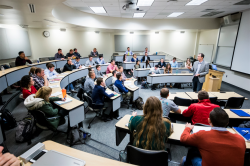Investing in Social Change
PROVO, Utah – Nov 20, 2017 – What if your financial investments could change the world? The Ballard Center for Economic Self-Reliance’s Impact Investing Program helps students do just that. Regardless of students’ backgrounds or majors, the program teaches them the fundamentals of determining which companies will be financially successful and create real social change.
Impact investing is essentially an extension of venture capital. But while venture capital gathers a multimillion dollar fund to invest in companies, an impact investing fund is generally gathered from socially minded investors with the expectation that the company will make a financial return and a social impact.
“In the impact investing ecosystem, there’s a wide variety of impact firms with different missions, values, and metrics,” says Riley Wells, a teaching assistant for the course. “Some impact investing firms are focused on financing social ventures in a particular geographic area, while others will only invest in companies that help people at the bottom of the pyramid in developing countries. It all depends on how the stakeholders define impact for themselves and what kind of impact they're targeting.”
Through the Ballard Center program, students have the opportunity to participate in a student-run impact investing firm at University Impact, located in Provo. Through paid internships that begin each semester, student interns play a critical role in determining whether University Impact will invest in growing social ventures.
The program also offers an impact investing class at BYU Marriott. The first month of the class is focused on understanding the impact investing ecosystem. Students learn the basics of investing in companies and assessing the social impact companies can make. During the remaining months, social businesses and social ventures come to class and pitch their ideas.
For the final project, student teams pick a company and delve deep into its business model, management team, market analysis, and due diligence to decide whether or not to make an investment. A number of companies have pitched to the class, including Ecoscraps, a company that recycles food waste to create organic compost, and Piero, which promotes a Bluetooth device for wheelchairs to help doors open automatically when wheelchairs approach.
“This class taught me that I can use my money to not just make more money but to also make a difference,” says Cole Rosenberg, an economics junior. “It has made me challenge my own definitions of impact and rethink whether a company is just doing something cool or is actually achieving poverty alleviation.”
The skills students learn in the program not only help them with future investments but also help them understand business acumen and gain knowledge that will guide them as future changemakers.
“I think the biggest skills you gain are analysis and deep thinking, specifically in a business setting, but also just in general,” Wells says. “The course has been helpful in trying to understand all of these companies that are so different.”
Wells and Kurt Brown, an adjunct professor of impact investing, are continuing to develop the program and implement the new student-run impact investing firm that will give students hands-on impact investing experience.
Those interested in taking the class can register for BUS M 491R section 002 in winter 2018 semester. For more information on the program, visit the Ballard Center website.
Media Contact: Alicia Gettys (801) 422-9009
Writer: Michaela Proctor




